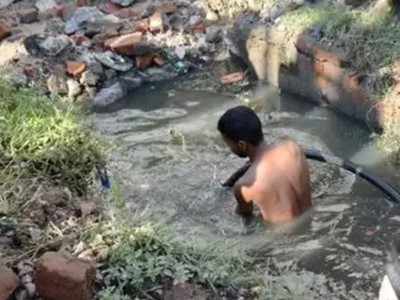The Times of India 04.08.2021
Government tells Parliament there have 941 deaths related to cleaning of sewers and septic tanks

NEW DELHI: The Central government informed the Rajya Sabha on Wednesday that while there are no reports of death due to manual scavenging, data shared by states shows that the number of deaths related to cleaning of sewers and septic tanks is 941. The maximum number of cases are from Tamil Nadu (213) followed by Gujarat (153) and UP (104). The national Capital has reported 98 cases.
To a question whether the government has data on the number of people engaged in manual scavenging who lost their lives in the course of employment, the minister of social justice and empowerment Virendra Kumar said "there is no report of death due to manual scavenging. However, we have reports regarding deaths of workers while being engaged in cleaning of sewers and septic tanks." He has shared data of 941 deaths based on reports from 21 state governments.
As far as the number of manual scavengers is concerned, the government has informed parliament that as per the two surveys conducted by local authorities in 2013 and 2018, 58098 persons were working as manual scavengers.
"All identified and eligible, 58098 manual scavengers have been paid one time cash assistance of Rs 40,000. To enable rehabilitation, skill development training has been provided to 16057 manual scavengers and their dependents," the minister for social justice said. He also shared that 1387 manual scavengers, sanitation workers and their dependents have been provided capital subsidy for self employment projects, including sanitation related projects.
Last week, the government's response to a similar question on manual scavenging in Rajya sabha had stirred a controversy with activists lashing out at the government.The Prohibition of Employment as Manual Scavengers and Their Rehabilitation Act 2013 bans the practice. On July 28, to a question about the number of people engaged in manual savending who died in the last five years, minister of state for social justice and empowerment Ramdas Athawale said, “no such deaths have been reported due to manual scavenging.” The statement immediately set off comparisons with the Centre's recent "no deaths due to oxygen shortage" statement.
TOI had reported on July 30 that in a reply to a similar question in Lok Sabha in February last year, while maintaining there had been no reports regarding deaths due to manual scavenging, the ministry said that “the National Commission for Safai Karamcharis has received reports regarding the death of persons while cleaning sewers and septic tanks.” The differentiation indicated that deaths due to surface scavenging might be rare. But it was not clear why this explanatory information which formed part of the reply last year was not specified in the July 28 response. Now in the reply to a question in Rajya Sabha on Wednesday, the ministry while responding explains that while there are no reports of deaths due to manual scavenging there were reports of deaths related to cleaning of sewers and septic tanks.
Earlier this year during the Budget session the ministry had informed Lok Sabha that as many as 340 people died while cleaning sewers and septic tanks during the last five years as per the cases reported by the states and UTs upto December 31, 2020. Maximum cases were reported from Uttar Pradesh at 52 deaths followed by Tamil Nadu (43), Delhi (36), Maharashtra (34), and 31 each in Gujarat and Haryana. The February 2020 answer also gave state-wise details of deaths and compensation paid.
Under the “Prohibition of Employment as Manual Scavengers and their Rehabilitation Rules, 2013” the employer who engages workers for cleaning sewers / septic tanks is obliged to provide the safety gear, devices and ensure safety precautions as prescribed in the rules."
To a query on
whether government has formulated any new plan to prevent manual
cleaning of sewers, the ministry had informed Lok Sabha in February this
year that a national policy for mechanised sanitation eco-system has
been formulated in consultation with the ministry of housing and urban affairs,
department of drinking water and sanitation which envisages appointment
of a sanitation authority in every district and response units in each
municipality equipped with necessary devices and vehicles.
